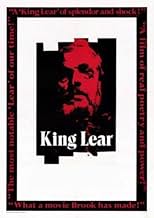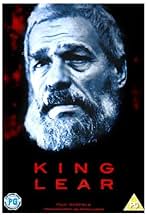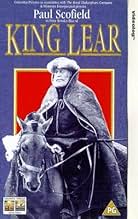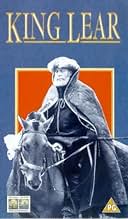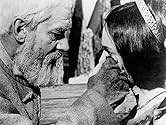Aggiungi una trama nella tua linguaKing Lear divides his kingdom among his daughters, giving great importance to their protestations of love for him. When Cordelia refuses to idly flatter the old man, he banishes her and turn... Leggi tuttoKing Lear divides his kingdom among his daughters, giving great importance to their protestations of love for him. When Cordelia refuses to idly flatter the old man, he banishes her and turns for support to his remaining daughters.King Lear divides his kingdom among his daughters, giving great importance to their protestations of love for him. When Cordelia refuses to idly flatter the old man, he banishes her and turns for support to his remaining daughters.
- Regia
- Sceneggiatura
- Star
- Premi
- 2 vittorie e 1 candidatura in totale
Recensioni in evidenza
Ah, now for my 100th review, chalked up after roughly four years of semi-regular sly-winking IMDb usury... What better for the "occasion" than a controversial adaptation of perhaps William Shakespeare's finest tragedy?
I watched this as part of my degree work on Shakespeare; I decided to focus on Shakespeare films, tracked down as many as I could and watched a good few. This was the first I viewed, and can I emphasise how contrasting a view of "Lear" it is as compared to Kurosawa's "Ran"? Whereas that film is wilfully expansive and an epic, if not a history, Brook's "King Lear" is a pared down, Beckettian film visualisation of the play. There are very few backgrounds, characters' faces frame so many shots, creating a claustrophobic focus. The interiors that there are are bleak, barren, less than inviting places; there is no sense of a royal grandeur (unlike "Ran") from which Lear falls.
Lear himself is played as an unfeeling, almost robotically callous chap early on, with Scofield delivering the lines in a very restrained, unexpressive way. This is far from the passionate, headstrong character of most performances. He is a husk of a man, and a dulling bully of a monarch, shown by the naturalistic, unbalanced violence he displays when in Goneril's castle. The feeling of Lear, later on in the play as genuinely a "fond" as well as "foolish" man, is downplayed deliberately. Again, the delivery of Shakespeare's poetry is muted. He comes across as perhaps too restrained and passionless in the later stages. The shift from power to impotence is however excellently conveyed during the storm scene, as first we see a shot of Lear from below, which then shifts quickly to one from a bird eye's view Lear has been shown first as in control and central and then rendered a mere insignificant human being, with no control over anything.
Scofield however, does do very well, carrying out this very distanced, disquieting Lear of Brook's instruction, to the letter.
Other actors impress, and are much as restrained; there is little or no actorly show here, the emphasis is on Beckettian delivery of lines, paring down the expression to suggest the futility of expression; words as a mechanical act churned out by humanity, making no difference in a barren, Godless universe. Brook uses Beckett's adage: 'There is nothing to express, nothing with which to express, nothing from which to express together with the obligation to express'. One can well say this is a reductive reading of Shakespeare, but it is spectacularly successful at its perhaps narrow aim. There are countless grounds in Shakespeare's Lear from which such an interpretation is born the play on 'nothing' 'Nothing will come of nothing' and the example of Cordelia's death, which suggest a Godless, reasonless world in its arbitrariness.
Visually, Jack MacGowran and Patrick Magee, notable Beckett actors, make strong impressions, like Scofield, even if their parts are smaller. Susan Engel and Irene Worth are excellent and look just right as Regan and Goneril respectively, whereas a particularly downplayed Cordelia doesn't make much impression - the Christ-like element is absolutely not dwelt upon here, predictably, for what is a nihilistic interpretation.
Peter Brook's film could perhaps be argued to take place in the Dark Ages, but Brook is clearly interpreting the play in a universally, timeless Beckettian sense. One could liken the film's austerity to the Swedish writer-director Ingmar Bergman, but this film is certainly pared down in terms of setting and costume when compared with 'The Virgin Spring' or 'The Seventh Seal'. Brook's approach to Shakespeare shares none of the solace that Bergman finds in humanity in 'The Seventh Seal' with Max von Sydow's Knight's sublime moments with the couple of players. Brook's world-view is clearly informed by the Jan Kott school of Shakespeare criticism; the natural world is a reflection of the human one. Both spheres are bleak and hopeless, as marked by the indiscriminate, desolate Northern landscapes and the equally random acts of cruelty and violence perpetrated by the characters. A complete lack of incidental music suggests Brook is trying not to distract the viewer in any way from the effect he is trying to create.
It has been argued this interpretation is reductive to the play's language, and single-mindedly closes off many avenues in the play Kingship, courtly manners and politics are but a few concerns that are neglected by Brook. Brook's film continually attempts to alienate the viewer, with jarring, incessantly restive camera movement and unorthodox angles. The moment of Gloucester's blinding sees Brook metaphorically blind the viewer to the action by having the screen blank; a Brechtian distancing technique, exposing the artifice of cinema and the subjective power the director has. Brook opts to make the play's usual climax point the Edmund-Edgar duel deliberately anti-climatic. He undercuts any heroism on Edgar's part by making the fight short and brutish, devoid of any skill whatsoever Edgar arbitrarily wins. Likewise, the fates of Goneril and Regan are dispatched with a hurried violence. This 'Lear' ends inconclusively with no hope for the future it does not end directly with Edgar's 'The weight of this sad time' speech, but with the shot of Lear's head tilting back, gradually out of sight against a completely white sky. This expression of emptiness both that Lear is going neither to Heaven or Hell and that things are not likely to get any better or worse.
A very impressive film, that certainly has divided critics. While the "ultimate" film "Lear" may not have been made yet (at least from the ones I have seen), this is a brilliant, bleak, Beckett-informed version. A powerful, wonderfully alienating and stark Shakespeare.
I watched this as part of my degree work on Shakespeare; I decided to focus on Shakespeare films, tracked down as many as I could and watched a good few. This was the first I viewed, and can I emphasise how contrasting a view of "Lear" it is as compared to Kurosawa's "Ran"? Whereas that film is wilfully expansive and an epic, if not a history, Brook's "King Lear" is a pared down, Beckettian film visualisation of the play. There are very few backgrounds, characters' faces frame so many shots, creating a claustrophobic focus. The interiors that there are are bleak, barren, less than inviting places; there is no sense of a royal grandeur (unlike "Ran") from which Lear falls.
Lear himself is played as an unfeeling, almost robotically callous chap early on, with Scofield delivering the lines in a very restrained, unexpressive way. This is far from the passionate, headstrong character of most performances. He is a husk of a man, and a dulling bully of a monarch, shown by the naturalistic, unbalanced violence he displays when in Goneril's castle. The feeling of Lear, later on in the play as genuinely a "fond" as well as "foolish" man, is downplayed deliberately. Again, the delivery of Shakespeare's poetry is muted. He comes across as perhaps too restrained and passionless in the later stages. The shift from power to impotence is however excellently conveyed during the storm scene, as first we see a shot of Lear from below, which then shifts quickly to one from a bird eye's view Lear has been shown first as in control and central and then rendered a mere insignificant human being, with no control over anything.
Scofield however, does do very well, carrying out this very distanced, disquieting Lear of Brook's instruction, to the letter.
Other actors impress, and are much as restrained; there is little or no actorly show here, the emphasis is on Beckettian delivery of lines, paring down the expression to suggest the futility of expression; words as a mechanical act churned out by humanity, making no difference in a barren, Godless universe. Brook uses Beckett's adage: 'There is nothing to express, nothing with which to express, nothing from which to express together with the obligation to express'. One can well say this is a reductive reading of Shakespeare, but it is spectacularly successful at its perhaps narrow aim. There are countless grounds in Shakespeare's Lear from which such an interpretation is born the play on 'nothing' 'Nothing will come of nothing' and the example of Cordelia's death, which suggest a Godless, reasonless world in its arbitrariness.
Visually, Jack MacGowran and Patrick Magee, notable Beckett actors, make strong impressions, like Scofield, even if their parts are smaller. Susan Engel and Irene Worth are excellent and look just right as Regan and Goneril respectively, whereas a particularly downplayed Cordelia doesn't make much impression - the Christ-like element is absolutely not dwelt upon here, predictably, for what is a nihilistic interpretation.
Peter Brook's film could perhaps be argued to take place in the Dark Ages, but Brook is clearly interpreting the play in a universally, timeless Beckettian sense. One could liken the film's austerity to the Swedish writer-director Ingmar Bergman, but this film is certainly pared down in terms of setting and costume when compared with 'The Virgin Spring' or 'The Seventh Seal'. Brook's approach to Shakespeare shares none of the solace that Bergman finds in humanity in 'The Seventh Seal' with Max von Sydow's Knight's sublime moments with the couple of players. Brook's world-view is clearly informed by the Jan Kott school of Shakespeare criticism; the natural world is a reflection of the human one. Both spheres are bleak and hopeless, as marked by the indiscriminate, desolate Northern landscapes and the equally random acts of cruelty and violence perpetrated by the characters. A complete lack of incidental music suggests Brook is trying not to distract the viewer in any way from the effect he is trying to create.
It has been argued this interpretation is reductive to the play's language, and single-mindedly closes off many avenues in the play Kingship, courtly manners and politics are but a few concerns that are neglected by Brook. Brook's film continually attempts to alienate the viewer, with jarring, incessantly restive camera movement and unorthodox angles. The moment of Gloucester's blinding sees Brook metaphorically blind the viewer to the action by having the screen blank; a Brechtian distancing technique, exposing the artifice of cinema and the subjective power the director has. Brook opts to make the play's usual climax point the Edmund-Edgar duel deliberately anti-climatic. He undercuts any heroism on Edgar's part by making the fight short and brutish, devoid of any skill whatsoever Edgar arbitrarily wins. Likewise, the fates of Goneril and Regan are dispatched with a hurried violence. This 'Lear' ends inconclusively with no hope for the future it does not end directly with Edgar's 'The weight of this sad time' speech, but with the shot of Lear's head tilting back, gradually out of sight against a completely white sky. This expression of emptiness both that Lear is going neither to Heaven or Hell and that things are not likely to get any better or worse.
A very impressive film, that certainly has divided critics. While the "ultimate" film "Lear" may not have been made yet (at least from the ones I have seen), this is a brilliant, bleak, Beckett-informed version. A powerful, wonderfully alienating and stark Shakespeare.
Peter Brook's film is a very bleak and barbaric interpretation of King Lear. He does a great job directing and whilst some of his experimentation doesn't pay off (such as very strange zooming with Kent at the beginning), when it does pay off it is fantastic (such as Lear's monologues)
Protagonists for William Shakespeare's plays run the gamut of age. From teenagers Romeo&Juliet to the ancient King Lear. Shakespeare was an ardent
observer of mankind at all ages.
I've often wondered if Shakespeare got the germ of an idea for Lear when in his lifetime he saw Emperor Charles V who had a lot of Europe and a lot of the new world under his control. Politics of the time dictated he divide his empire and half went to his son who became Philip II of Spain and the other half went to brother Maximilian of Austria. Charles died in a monastery 2 years later.
It might have been better for Lear if he had locked himself up in a monastery and stayed there. But he was a tired old man and he had daughters instead of suns. Two daughters flatter the old guy and they get two halves of the kingdom. The third doesn't play that game and he cuts her off.
Then instead of staying in a monastery, the daughters and their husbands make it real clear to Lear that his advice and counsel aren't needed or wanted. Quite a shock coming from his 'faithless' children.
Peter Brook directed and also augmented Shakespeare's plot with some of his own ideas. More than Bard purists denounced the production, but as I remember they fit into the play structure nicely.
Brook also shot the film on the bleak and craggy shores of the Danish coastline. You can hardly tell this is a color film. But that also fit in well with the bleak and moody atmosphere of the play itself.
One undeniable asset this King Lear has is Paul Scofield in the title role. He is nothing short of superb in the title role and he underplays a lot more than either Laurence Olivier or Orson Welles in the same part. His closeups tell a great deal of the story.
This is not the best King Lear, but for Paul Scofield fans an absolute must.
I've often wondered if Shakespeare got the germ of an idea for Lear when in his lifetime he saw Emperor Charles V who had a lot of Europe and a lot of the new world under his control. Politics of the time dictated he divide his empire and half went to his son who became Philip II of Spain and the other half went to brother Maximilian of Austria. Charles died in a monastery 2 years later.
It might have been better for Lear if he had locked himself up in a monastery and stayed there. But he was a tired old man and he had daughters instead of suns. Two daughters flatter the old guy and they get two halves of the kingdom. The third doesn't play that game and he cuts her off.
Then instead of staying in a monastery, the daughters and their husbands make it real clear to Lear that his advice and counsel aren't needed or wanted. Quite a shock coming from his 'faithless' children.
Peter Brook directed and also augmented Shakespeare's plot with some of his own ideas. More than Bard purists denounced the production, but as I remember they fit into the play structure nicely.
Brook also shot the film on the bleak and craggy shores of the Danish coastline. You can hardly tell this is a color film. But that also fit in well with the bleak and moody atmosphere of the play itself.
One undeniable asset this King Lear has is Paul Scofield in the title role. He is nothing short of superb in the title role and he underplays a lot more than either Laurence Olivier or Orson Welles in the same part. His closeups tell a great deal of the story.
This is not the best King Lear, but for Paul Scofield fans an absolute must.
"King Lear" is not one of my favourite Shakespeare plays (sacrilege indeed!) but I must say I find this film version immensely impressive and the best film version of Shakespeare I have seen.
The key to this is the direction of Peter Brook. Unquestionably this is an "arty" avant-garde production that has echoes of Bergman and Beckett as other reviewers have noted. For me this works extremely well. The choice of a barren Danish landscape in winter, the use of black and white, and unusual decision to eschew music all contribute to a very dark and bleak atmosphere. The director keeps viewers on their toes and presents a despairing tragedy.
There is nothing theatrical about this - quite rightly as this is a film version. The performances are restrained and measured. The acting is very strong - Patrick Magee particularly stands out as a very menacing Cornwall while Susan Engel and Irene Worth are fine as the manipulative elder sisters.
My only real reservation is that the climax of the film is rather rushed, with the numerous deaths needing a little more reflection. The suicide of Goneril is though extremely powerful. Lear's death is always poignant but the direction of it doesn't work completely.
Opinions are very mixed on this film but I certainly think it deserves attention. It would especially appeal to followers of Bergman and anyone who is struck by a dark tale.
The key to this is the direction of Peter Brook. Unquestionably this is an "arty" avant-garde production that has echoes of Bergman and Beckett as other reviewers have noted. For me this works extremely well. The choice of a barren Danish landscape in winter, the use of black and white, and unusual decision to eschew music all contribute to a very dark and bleak atmosphere. The director keeps viewers on their toes and presents a despairing tragedy.
There is nothing theatrical about this - quite rightly as this is a film version. The performances are restrained and measured. The acting is very strong - Patrick Magee particularly stands out as a very menacing Cornwall while Susan Engel and Irene Worth are fine as the manipulative elder sisters.
My only real reservation is that the climax of the film is rather rushed, with the numerous deaths needing a little more reflection. The suicide of Goneril is though extremely powerful. Lear's death is always poignant but the direction of it doesn't work completely.
Opinions are very mixed on this film but I certainly think it deserves attention. It would especially appeal to followers of Bergman and anyone who is struck by a dark tale.
As has happened so many times with the Oscars, another great film-actor-ensemble has been neglected. Recognised nearly universally as the ultimate test of an actor's craft, Paul Scofield as Lear in this 1971 version could be deified for his performance, even more complex than his Oscar-winning Thomas More in 1966's best pic "A Man For All Seasons". Viewing this film should be a prerequisite not just for R.A.D.A. acting students. Incorporating as he did the essence of Lear so organically, Scofield sadly was not even nominated, another nod to the lowest common denominator public taste. This review, nearly forty years after the pic's release, was an on-the-spot spontaneous impulse after yet another viewing of the film. People are afraid of Shakespeare(a.l.a. DeVere); don't be. All, but especially any pained by their own offspring, will turn away from the screen with much more than a penny's worth of thought and a rediscovery of the art of Paul Scofield and ensemble. It is a cliché, but they just don't make movies like this one anymore.
Lo sapevi?
- QuizBrook based this production on ideas expressed by Polish theater critic Jan Kott in the book "Shakespeare, Our Contemporary".
- Curiosità sui creditiNot only is there no music in the film, but there are no "ambient sounds" at all during the opening credits, giving the impression that they were filmed using no soundtrack whatsoever.
- ConnessioniFeatured in Shakespeare, Rise of a Genius: Episodio #1.3 (2023)
I più visti
Accedi per valutare e creare un elenco di titoli salvati per ottenere consigli personalizzati
- How long is King Lear?Powered by Alexa
Dettagli
- Tempo di esecuzione2 ore 17 minuti
- Colore
- Mix di suoni
- Proporzioni
- 1.66 : 1
Contribuisci a questa pagina
Suggerisci una modifica o aggiungi i contenuti mancanti


